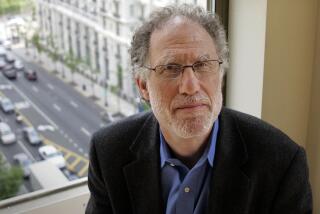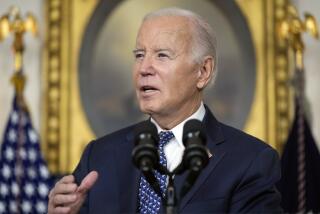Action Urged on Leaked King Memo
As Justice Department officials scrambled Friday to control damage from the improper release of a confidential prosecution memo in the Rodney G. King beating case, members of Congress called for a swift inquiry and sources said investigators are studying several theories, including whether the document was released by a government “mole.”
In addition, The Times learned that one of the lead prosecutors in the case has suggested that the document may have been purloined by a burglar.
Sen. Joseph R. Biden Jr. (D-Del.) said he was “deeply disturbed” by reports that the memorandum--which lays out the prosecution’s case, including questions about the credibility of King and other witnesses--had been given to one of the defense lawyers. Biden, who chairs the Senate Judiciary Committee, urged Atty. Gen. William P. Barr to quickly resolve the matter with disciplinary or criminal action against anyone found responsible.
Rep. John Conyers (D-Mich.), who chairs the House Government Operations Committee and is a senior member on the Judiciary Committee, called for a court-appointed independent counsel to examine the leak.
“Whoever leaked the memo may have effectively sabotaged the federal prosecution against the four LAPD officers and may be guilty of obstruction of justice,” Conyers said. He called the leak “a possible conspiracy by officials in the Justice Department to acquit the LAPD, whose brutal acts of violence were seen around the world on videotape. . . . We have a major crisis of confidence inside the Justice Department.”
Justice Department officials had no comment.
The Times reported Friday prosecutors had allowed a copy of the sensitive memorandum to fall into the hands of one of the defense lawyers in the highly charged case against four Los Angeles police officers accused of violating King’s civil rights. The document’s release--whether by mistake or by design--has embarrassed the government, raised questions about the potential effects on the case and fueled concerns about security within the Justice Department.
In a statement released by his office, Biden said: “Disclosure of this memorandum would constitute an inexcusable breach of security in a highly sensitive case of national importance.”
Biden also asked the Justice Department to report “as soon as possible” on the progress of its internal investigation.
Biden and Conyers are key members of congressional committees that oversee criminal justice issues.
Even as pressure increased on the Justice Department to locate the source of the leak, officials insisted that the document’s contents do not threaten the government’s prosecution of the police officers.
One source who has read the document told The Times that in addition to laying out the government’s prosecution strategy, the memo details credibility problems with King and other witnesses. Of King, the source said the memo calls attention to his conflicting statements about whether the beating was racially motivated.
The source said it also questions the credibility of California Highway Patrol Officer Melanie Singer and that of Bryant Allen, who was a passenger in King’s car the night of the March 3, 1991, beating.
Though potentially damaging to the government’s case, those issues were widely known, and sources said the memo was written well before the officers were indicted in August. As a result, prosecutors have had time to adjust their strategy, according to observers inside and outside the Justice Department.
“Assuming that the document says what it reportedly does, I don’t think it’s all that damaging,” said Laurie Levenson, a Loyola Law School professor and former federal prosecutor. “Also, I would be much more concerned if you had a leak (of prosecution strategy) at this stage, rather than a few months ago.”
From the prosecution’s standpoint, however, the case already is considered a difficult one, as government lawyers will be required to prove that the officers intentionally sought to deprive King of his civil rights during the beating.
Most officials agreed and expressed confidence that the case could go forward despite the memo’s release. Meanwhile, sources say the Justice Department’s Public Integrity Section is investigating several theories of how it fell into the hands of Michael P. Stone, the lawyer for Officer Laurence M. Powell.
While some sources suggest that the release may have been a mistake, most Justice Department officials appear to believe it was intentional--either the result of a mole inside the prosecution team or even of a break-in at the U.S. attorney’s office in Los Angeles.
The possibility of a break-in was suggested by Assistant U.S. Atty. Steven D. Clymer, one of the lead prosecutors in the case, during a closed-door session with U.S. District Judge John G. Davies, according to two sources who asked anonymity.
Clymer and Terree A. Bowers, the U.S. attorney for the Central District of California, declined to comment Friday, as did others who attended the session before Davies.
Others close to the case were not inclined to accept the break-in theory, but gave more credence to the idea that a mole inside the Justice Department may have mailed the document to Stone in order to help him prepare his client’s defense.
“It’s no secret that there is some sympathy for these officers in law enforcement circles,” said one source who asked not to be identified. “It’s possible that there is someone in the Justice Department who wanted to help them.”
With his claims of a possible “conspiracy” to acquit the officers, Conyers appeared to back that theory. “Such a conspiracy would undermine the integrity of the entire criminal justice system as it relates to African-Americans,” Conyers said.
The officers accused in the beating of King, who is black, were acquitted on all but one count during a state trial last spring. The verdicts touched off the Los Angeles riots, and the federal case is being closely watched in part because of concerns that acquittals could spark more violence.
After reports of the memo surfaced Friday in The Times and on National Public Radio, anxiety ran high in the prosecution camp, but there also were signs the incident has helped to deepen a rift on the defense side.
Lawyers for Officer Theodore J. Briseno and Sgt. Stacey C. Koon said they were disturbed by reports that Stone had received the memo but returned it to prosecutors before sharing it with the other defendants or their lawyers.
“It’s not clear in my mind that he would have to return it if it was sent to him,” said Harland W. Braun, who represents Briseno.
Ira Salzman, who represents Koon, declined to comment in detail, but said: “That account, if true, raises issues that need to be resolved.”
None of the defense lawyers or prosecutors will talk about the contents of the memo, and sources say that all the parties are under a gag order imposed by Davies. One result of that order is that defense lawyers apparently cannot talk about the memo even among themselves, frustrating their efforts to join forces in advance of next year’s trial.
Even before the leak of the memo became public, Salzman and Braun each filed motions in federal court challenging Stone’s right to continue representing Powell. Although Braun’s motion has been dismissed, Salzman continues to argue that Stone has a conflict of interest in the case, and should be removed.
Stone could not be reached for comment. He has repeatedly declined to discuss the memo or to acknowledge its existence.
Newton reported from Los Angeles; Ostrow from Washington. Times staff writer Richard A. Serrano also contributed to this story.
More to Read
Start your day right
Sign up for Essential California for news, features and recommendations from the L.A. Times and beyond in your inbox six days a week.
You may occasionally receive promotional content from the Los Angeles Times.







